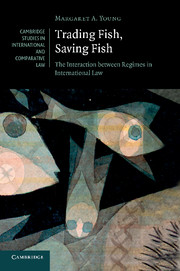Book contents
- Frontmatter
- Contents
- Foreword
- Acknowledgements
- Table of cases
- Table of Conventions, Declarations and procedures
- List of abbreviations
- Part I Trading Fish, Saving Fish
- Part II Selected Case Studies
- Chapter 3 The negotiation of WTO rules on fisheries subsidies
- Chapter 4 The restriction of trade in endangered marine species
- Chapter 5 Adjudicating a fisheries import ban at the WTO
- Part III Towards Regime Interaction
- Appendices
- Bibliography
- Index
- CAMBRIDGE STUDIES IN INTERNATIONAL AND COMPARATIVE LAW
- References
Chapter 3 - The negotiation of WTO rules on fisheries subsidies
Published online by Cambridge University Press: 28 April 2011
- Frontmatter
- Contents
- Foreword
- Acknowledgements
- Table of cases
- Table of Conventions, Declarations and procedures
- List of abbreviations
- Part I Trading Fish, Saving Fish
- Part II Selected Case Studies
- Chapter 3 The negotiation of WTO rules on fisheries subsidies
- Chapter 4 The restriction of trade in endangered marine species
- Chapter 5 Adjudicating a fisheries import ban at the WTO
- Part III Towards Regime Interaction
- Appendices
- Bibliography
- Index
- CAMBRIDGE STUDIES IN INTERNATIONAL AND COMPARATIVE LAW
- References
Summary
Recognizing that their relations in the field of trade and economic endeavour should be conducted … while allowing for the optimal use of the world's resources in accordance with the objective of sustainable development, seeking both to protect and preserve the environment…
In Part II, I provide three detailed case studies of the interaction between regimes in global fisheries governance. In the current chapter, I analyse regime interaction during the making of new laws to promote fisheries sustainability. The second chapter of Part II concentrates on the implementation of existing laws within the CITES and FAO fisheries management regimes. The third chapter assesses the adjudication of disputes that arise in the WTO over import measures on fish products. Each of these case studies highlights different stages of international law to draw out relevant aspects of regime interaction. As mentioned in Chapter 1, the current literature on fragmentation of international law tends to focus only on the dispute settlement stage, when an international tribunal is called upon to adjudicate conflicting norms. The methodology of this book and the research presented in this Part seeks to expand upon that approach.
Although each case study is chosen to emphasise discrete points in the process of international law, my selected issue areas are obviously not so bounded. For example, I use the issue of fisheries subsidies in this chapter to demonstrate how regimes are taken into account when international law is made, but there may be a time when a dispute over fisheries subsidies is filed at the WTO. Similarly, although Chapter 4 assesses the implementation of existing law from the CITES and FAO fisheries management regimes, the constant updating by the parties of new CITES species could arguably be conceived as the making of new law.
- Type
- Chapter
- Information
- Trading Fish, Saving FishThe Interaction between Regimes in International Law, pp. 85 - 133Publisher: Cambridge University PressPrint publication year: 2011



